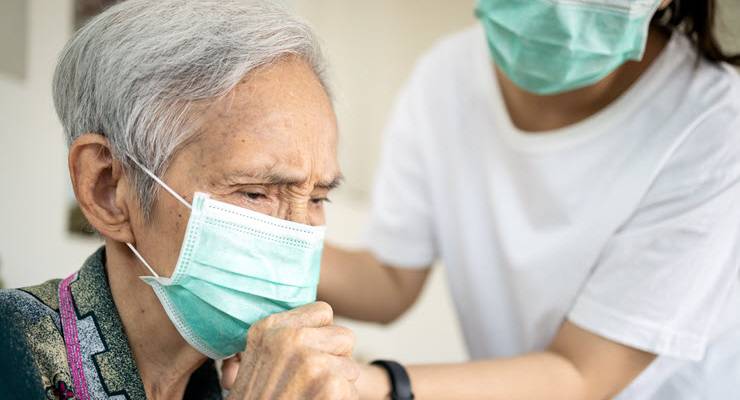
I feel lucky that I haven’t lost a patient to COVID-19.
Sydney’s northern suburbs, where I work, have escaped the worst of this pandemic.
Early on, I was anxious. Many of my patients are elderly, or are suffering from complex genetic or autoimmune problems, and I knew they would be particularly vulnerable. I told them to stay at home, echoing the advice of our chief medical officers.
As of today, our statistics look good. But something more is happening behind the scenes, particularly affecting those who don’t have loud voices, or the capacity to express their concern.
One of my long-term patients, who needs a walking frame, entered my clinic room not long ago. Instead of a cheery greeting, her eyes stayed on the floor, her previous wit and spark dulled.
Her carer told me that her nursing home would no longer let residents go out to church, so she hadn’t been able to play the church organ. “Music was her whole life,” her carer said.
She’d tried to play the piano at the nursing home, but progressive neurological disease means that skills that are lost are never able to be regained.
Another elderly man deteriorated so much that he went from being engaged in his grandchildren, interested in the outside world, to finding it hard to even follow a television show from start to finish. Further testing revealed a picture consistent with Alzheimer’s Disease.
I’ve seen this scenario multiple times.
Pandemic lockdowns may not cause dementia, but they certainly seem to contribute to accelerated progression.
Adequate mental functioning becomes inadequate once society throws in loneliness, isolation from family and friends, decreased movement and loss of challenging activities like driving and shopping.
It’s not a decline which will recover.
I am loathe to put people on pharmaceutical antidepressants unless they are really needed, especially older people who are particularly sensitive to the side effects.
But in 2020, they have been needed. Some of the stories are heartbreaking.
One man almost lost his will to go on once he was unable to have his grandchildren visit him in his nursing home. Another man is distraught that he cannot visit the nursing home to share happy childhood anecdotes with his slowly withering sister; her mind addled by dementia, and only activated by memories from long past.
Others have been imprisoned with kindness by their children; some of them have barely left the house since March.
But if you don’t leave the house, you don’t get any of the injections of brain and mood fuel that we take for granted — the smile from the grocery store cashier, the vitamin D from the walk to the park, the elevated heart rate from finding the perfect present for a new granddaughter at the local store.
If you live alone, the loneliness can be stifling.
There is no doubt that lockdowns, quarantine and social distancing are our best measures to stop the spread of COVID-19. We accept however that there are drawbacks, and many researchers are measuring the effects of missed medical appointments and screening, decreased exercise, increased domestic violence and mental health problems in children.
We must also think of our elderly. Particularly those in nursing homes who are often physically and cognitively frail. They often already have a diagnosis of dementia or Parkinson’s disease.
They may already be receiving treatment for depression. Measuring decline or unhappiness can be much harder. Conversations with my colleagues reveals that we are all seeing the same thing.
Precipitous cognitive worsening, or new presentations of dementia; deep sadness and disconnect in elderly people stranded at home; despair for those separated from loved ones in nursing homes; and a decline in function that will likely never be reversed.
And while it may be easy to suggest that our elderly restart their old lives, they also grapple with the fear of a virus which will kill one in six of those of their age who contract it, along with the terror of knowing that a COVID-19 death is often a lonely one.
I hope we can start to measure how COVID-19 affects the twilight of life; how many happy days are stolen, and how many independent functions are lost.
We must ensure the prevention is not worse than the disease.








I believe that the interfering busy bodies and sociopaths who cluster in our governments have absolutely no business, nor right, to interfere in the life or death of older people. If they can specify how and by whose hand we should die (that most final intimate and frightening of our experiences) then why can’t we reciprocate and make those decisions about them? I did not give our politicians or governments permission to decide about my state as I neared death. Their cruel treatment of desperate refugees, cruel pursuit of the unemployed and desperate for bogus debts to government, cruel aged care systems, arbitrarily stranding thousands of citizens overseas to meet obscure bureaucratic criteria, failure to hold government staff to account no matter how many deaths they have caused (Ruby Princess, aged care, quarantine hotels), all of these and more indicate government by the psychopathic, parasitic and inept.
Not only do our seniors deserve better, we all do. We must fight for our rights and our right to a peaceful death including positive and peaceful rights to prepare for our own passing are two which grow in importance as we age.
Again, evidence of no plan to protect aged care from both the illness and the unintended consequences of protection measures. Yet, Colbeck still takes home his ministerial pay. What an unmitigated shambles from whichever perspective you view it. Another Morrison Government ‘missing in action’ debacle.
I am one of the oldies but I live in WA where we have had a hard border from day one and except for a few weeks at the beginning, I have been living a near normal life, do the shopping, see the doctor have meeting with our social group, go for lunch at restaurant’s. Perhaps going hard and fast but not long, is a solution.
A properly resourced and regulated aged care system should be capable of providing a safe and comfortable place for older people to live and manage do that they maintain vital connection with family and the society. It is high time the Federal Government did its job.
Lets hope for a vaccine. There are no easy answers or choices for all. Recently retired are robbed of their new freedom, time lost may not be stored. School leavers have aspirations thwarted, their senses dulled for the future. Young families are cruelly cooped up. Compassion is OK (thanks for your article, a window into that generation). There was little in the Budget for aged care, a Commonwealth responsibility, and nothing for correction of wage suppression for aged care workers.
Real news is NOT giving permission to drink in pubs standing up for heavens sake, seating in coffee shops, pandering to commercial interests. The Morrison independent Covid Committee is made up of advisers with SEVERE conflicts of interest. Real news is the progress being made on vaccine trials and gearing up for the second wave emerging in Europe that may reach here. The Belgium govt calls it a tsunami. At last everyone favours wearing a mask….don’t they? At schools?